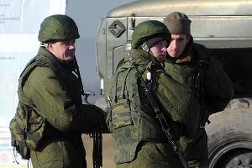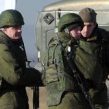
Rebel Group Escapes Security Forces in Chechnya
Publication: Eurasia Daily Monitor Volume: 8 Issue: 88

The Kavkazsky Uzel website today (May 6) quoted a Chechen law-enforcement source as saying that a group of up to 15 militants spotted earlier this week in a wooded mountainous area between the villages of Shalazhi and Roshin-Chu in Chechnya’s Urus-Martan district managed to escape security forces. The source said they were unable to find the militants despite help from helicopters that were used in a search that covered the Shatoi, Vedeno and Urus-Martan districts. The source said the militants had probably broken into smaller groups of two-to-three men each and managed to escape to a secret base.
The operation targeting the Chechen militants began on March 4 in the Urus-Martan district, where helicopters fired rockets into the area where the rebels were thought to be located. The Chechen law-enforcement source told Kavkazsky Uzel that the group of militants was probably the same one discovered near the village of Sharo-Argun in Chechnya’s Shatoi district on May 2, when a shootout between rebels and security forces left two rebels and one Russian Interior Ministry serviceman dead, and another Russian serviceman wounded. One of the slain rebels turned out to be Doger Sevdet, a Turkish citizen know by the nom de guerre “Abdullah Kurd” and “Salauddin,” while the other was identified as Ramzan Bartiev, a local resident aka “Dzhudullah” (www.kavkaz-uzel.ru, May 5-6).
Russia’s National Anti-Terrorism Committee (NAK) said in a statement released on May 4 that Abdullah Kurd “was a member of the so-called Arab groups of al-Qaeda under the command of Khattab, Abu al-Walid and Abu Hafs, whose criminal activity was suppressed before by the Russian FSB (Federal Security Service) with the participation of law enforcement officers.” The RIA Novosti news agency quoted the NAK in describing Abdullah Kurd as an al-Qaeda “emissary” to the North Caucasus and “the chief coordinator of international terrorists in the volatile region.” According to the news agency, Abdullah Kurd, along with Chechen rebel leader and Caucasus Emirate emir Doku Umarov, “organized most of the terrorist attacks involving suicide bombers in Russia” and was also “a coordinator of foreign financial inflows for the criminals.” The news agency reported that Abdullah Kurd came to the North Caucasus in 1991 via Georgia’s Pankisi Gorge (RIA Novosti, May 4).
On April 21, security forces in southeastern Chechnya killed a Saudi national known by the nom de guerre Moganned who, according to the NAK, was al-Qaeda’s “emissary” in the North Caucasus and the “guarantor” of financing for the region’s “terrorist underground” (EDM, April 22).
On May 4 Kavkazsky Uzel quoted an unnamed North Caucasus Federal District law-enforcement official as saying that authorities in the region are bracing for a possible increase in rebel attacks in connection with the killing of Osama bin Laden by US commandos in Pakistan on May 2, but that no special security measures were being taken in the North Caucasus in response to bin Laden’s death. At the same time, the website noted that some experts say the Russian special services claims that al-Qaeda is active in the North Caucasus have not been proven. Kavkazsky Uzel quoted Andrei Soldatov, editor of the Agentura.ru website, as saying that al-Qaeda is not strongly influential in the North Caucasus and that bin Laden’s death is therefore unlikely to influence the situation in the region (www.kavkaz-uzel.ru, May 4).
On May 1, three policemen were wounded near the village of Ezhelakhtoi in Chechnya’s Vedeno district when an improvised explosive device went off as they were conducting a reconnaissance mission (www.kavkaz-uzel.ru, May 2).
In Dagestan, meanwhile, a policeman was killed on road in the village of Nizhniye Makharkhimakhi on May 4 when an IED was detonated as a police car was driving by, after which unidentified attackers opened fire on the vehicle with automatic weapons. One policeman died of gunshot wounds while another was wounded. A law-enforcement source said a rebel base was discovered near the site of that attack and that ammunition, an explosive device and “extremist” literature was found there. That same day, unidentified attackers shot up a police post in the Dagestani city of Kizlyar, killing one policeman and wounding five civilians who happened to be driving near the post at the time of the attack. Also on May 4, one policeman was killed and another wounded when gunmen fired on a police vehicle in Dagestan’s Sergokalinsky district (www.kavkaz-uzel.ru, May 5).
On May 1, the chief of the Sergokalinsky district police department, Nasrullah Magomedov, was shot by unidentified gunmen outside his home in the village of Sergokala. He died from his wounds in the hospital (www.kavkaz-uzel.ru, May 2). On April 30, unknown attackers shot up a cellular phone base station near the village of Chernyevka in Dagestan’s Kizlyar district. Investigators found forty 7.62 mm and 5.45 mm shell casings and unused rounds along with an unused Molotov cocktail at the scene of the attack (www.kavkaz-uzel.ru, May 1).
In Karachaevo-Cherkessia, unidentified arsonists tried to burn down a church in the village of Kost-Khetagurova on April 30. Sections of the floor and some windows were burned, but the church was not significantly damaged. On the evening of April 29, the body of police sergeant with bullet wounds was discovered in the city of Cherkessk. Three men suspected of involvement in the murder were later arrested (www.kavkaz-uzel.ru, April 30).
In Kabardino-Balkaria, a suspected rebel blew himself up with a grenade after police stopped his car on the outskirts of the village of Chernaya Rechka in the republic’s Urvansky district on April 29. The alleged militant was identified as Ruslan Dolov, a 22-year-old resident of Nalchik (www.kavkaz-uzel.ru, April 30).




